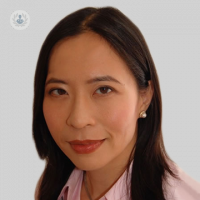New treatments for thyroid eye disease: a discussion
Written by:An over-active thyroid due to Graves' disease occurs in up to 1 in 100 women in the reproductive age range. Up to half of patients with Graves hyperthyroidism can be affected by thyroid eye disease (TED). Leading consultant ophthalmic and oculoplastic surgeon Miss Vicki Lee discusses current treatment options for thyroid eye disease.

What is thyroid eye disease (TED) associated with?
TED, commonly associated with bulging forward eyes (exophthalmos) and raised upper eyelids (eyelid retraction), can lead to various physical discomforts such as eye pain, grittiness, excessive watering, and light sensitivity. Moreover, it triggers significant inflammation within the eye socket (orbit), resulting in muscle swelling and increased fat deposits. This inflammation, occurring within the confined space of the orbit, may displace the eye forward and cause double vision due to asynchronous eye movements. These changes often cause profound psychological distress that can severely blight patient’s lives.
However, many TED patients with significant disfigurement are classified as having ‘mild’ clinical disease. This is partly because there has been no effective treatment available for this group of patients apart from stabilising their overactive thyroid levels, using soothing eyedrops and taking Selenium supplements.
What problems are linked to TED?
Approximately 1 in 4 TED patients develop disabling double vision that can stop them from driving and/or severe inflammation, which leads to constant pain and swelling.
These individuals could find relief through immunosuppression treatment targeting the underlying inflammation. Up to 1 in 20 can suffer significant visual loss that requires high-dose immunosuppression, and in some cases, urgent surgery.
How does TED treatment improve quality of life?
Successful TED treatment can quickly reverse visual problems and disfigurement, have a good safety profile and improve a patient’s quality of life. Unfortunately, no treatment that fulfils all the above criteria is currently available outside the USA.
In Europe and many parts of the world, patients with moderate to severe TED are offered either intravenous or oral steroids, alongside other treatments to suppress the immune system. These treatments are reasonably safe if monitored closely and effective in preventing vision loss and relieving pain and swelling. Additionally, in some cases, they can improve double vision. However, these treatments do not usually reverse the exophthalmos (shrink the eyeballs backwards into the eye sockets).
Significant exophthalmos is usually treated by orbital decompression surgery (breaking open the eye socket walls to enlarge the orbital cavity to allow the eye to settle backwards). The majority of doctors do not recommend this major surgery to improve the exophthalmos until the orbital inflammation has settled and the hyperthyroidism has been effectively and permanently treated. This is to reduce the risk of the TED flaring up again after the surgery. As a result, many TED patients face years of living with their disfigurement before having this surgery.
What are the latest developments in TED treatment?
Fortunately, recent advancements in TED treatment bring promising news. Tepezza™, approved for TED treatment in the USA since 2019, has shown remarkable success in reversing disfigurement and inflammation in numerous TED patients, sparing many from the need for orbital decompression surgery.
Although Tepezza is currently only accessible in the USA, several pharmaceutical companies worldwide are actively developing new treatments for TED. These treatments include drugs that function similarly to Tepezza, as well as those utilising innovative mechanisms based on emerging scientific insights into TED's underlying causes. Patients now have the opportunity to access these new treatments by participating in ongoing clinical trials conducted in the UK.
If you would like to participate in these trials, you should discuss with your eye specialist for a referral to these trial centres. Details can be found on https://clinicaltrials.gov
If you would like to book a consultation with Miss Lee, simply visit her Top Doctors profile today.
Sources
https://cks.nice.org.uk/topics/hyperthyroidism/background-information/prevalence/
https://link.springer.com/article/10.1007/s40123-021-00385-8


